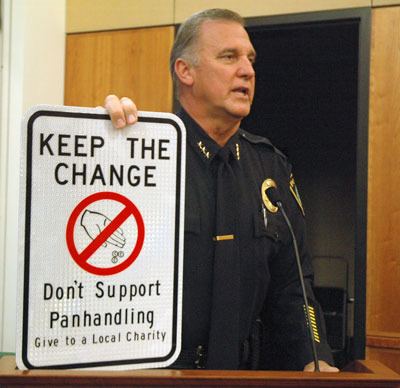ARLINGTON — Arlington Police Chief Nelson Beazley’s presentation to the Arlington City Council on Monday, Sept. 16, yielded an extended discussion on the impacts of vagrancy, drug trafficking and police department staffing levels on the Arlington community.
The meeting opened with former Arlington Police Officer Molly Ingram being sworn back into the Arlington Police Department by city of Arlington Attorney Steve Peiffle, after she’d previously served in the Arlington Police Department from 2005-08, and then moved the Marysville Police Department.
“She’s back where she belongs, and her return is extremely timely,” Beazley said. “Her experience level means that her training will be expedited greatly. As we’re looking to fill a tremendous void here, it’s a great time to have Molly back.”
When it came time for his own presentation, Beazley brandished a street sign that was inspired by the city of Marysville’s anti-panhandling efforts, and attributed much of the panhandling in the Arlington community to the impact of illegal drugs, most notably heroin.
“It’s difficult to go after panhandlers legally, since the Constitution says that people have the right to solicit money, and the laws require that you have to prove that they’re intending to intimidate others,” said Beazley, who reported that Marysville Police Chief Rick Smith had informed him that anti-panhandling street signs had dramatically reduced the amount of panhandling in the city of Marysville, by reminding businesses and members of the public not to give any money directly to panhandlers. “If you want to give, give that money to community service organizations that help provide those people with food and shelter, so they can’t spend it on drugs.”
Beazley estimated that such street signs cost between $30 to $40 each, and identified the low price of heroin as an inciting factor in local crimes ranging from vehicle prowls to home burglaries.
“It only costs $10 for a 10th of a gram of heroin, which is half a day’s dose,” Beazley said. “Our officers have identified a number of homeless heroin addicts, and we’re now looking to identify community services that could impact their addiction cycles. We could have those service people ride along with us on calls. Even if it only makes a difference to one or two addicts, that’s still one or two less addicts than we have to deal with right now.”
When City Council member Debora Nelson asked what percentage of 911 calls made to the Arlington Police Department deal either directly or indirectly with drugs, Arlington Police Detective Jason Rhodes estimated that 75 percent of such calls received by the police department involve known drug users, with heroin being the chief culprit in 95 percent of those cases. He likewise attributed the increase in burglaries in Smokey Point to the rise of a roughly 100-strong transient population in the area.
“It’s a challenge for us to get rid of drug sellers, because our police department is not built for long-term drug investigations, and none of our drug cases are able to be wrapped up in 22 minutes like they are on TV,” Beazley said. “Drug investigations are so complex, even just in the requirements for search warrants and prosecutions. I thought California was restrictive on that score, but it doesn’t hold a candle to Washington. We try to triage our information and go after who we can get the quickest, but the war on drugs has already been lost. I know that’s not what people want to hear, but we’re swimming against a tsunami.”
When Arlington Mayor Barbara Tolbert asked what the city’s citizens could do, Beazley reiterated not to give panhandlers any money, as well as to always lock their vehicles and never leave any valuables inside.
“And if you see a crime, don’t wait to tell us,” Beazley said.
“I used to not call 911, because I didn’t want to be a bother, but it was Officer Molly who told me that it was okay,” Nelson said.
Because the Arlington Police Department has not been fully staffed in the entire time that Beazley has served as its chief, he couldn’t even speculate on whether it would be cheaper to fill more of those open positions, or to continue paying his staff overtime for shift extensions and backfill hours.
“I’d love extra officers, but I get that takes money,” Beazley said. “If I had two more officers, I would restart the Pro-Act Team.”







